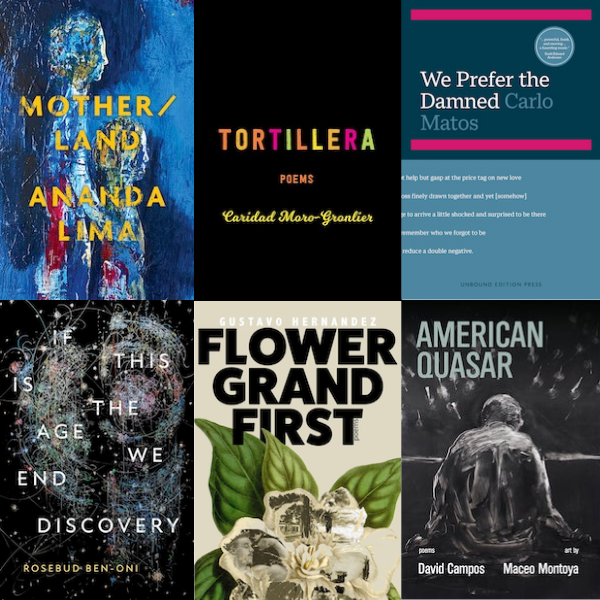
Contributor Bio
Ruben Quesada
More Online by Ruben Quesada
New Confessions: Six Books by Latinx Poets
by Ruben Quesada
In many ways, the desire to describe human plurality is at the heart of the American experience. Poets and writers, especially, contend and create with an ontological self-awareness that is capable of enlarging our view of the world and expanding our understanding of each other. The 2021 poetry collections highlighted here, rooted in Latin American cultures, explore the beauty of science, religion, and popular culture. They enlarge the poetic landscape and expand Latinx and Latin American linguistic and geographical boundaries.
Writing on the oral poetic tradition and history, Ruth Finnegan once explained that there is a common assumption that the “oral tradition” is a monolith, a self-evident entity—but, actually, there are “three main classes of oral tradition: recognized literary forms, generalized historical knowledge, and personal recollections.” These varied elements also perfectly describe the variety of 2021 poetic works listed here. The Latinx community is not a monolith.

Texas Review Press
In Tortillera by Caridad Moro-Gronlier, readers follow a Cuban-American woman as she tries to understand her sexuality and challenges the expectations of her close-knit community of family and friends. Though this may seem a heavy topic, the collection offers moments of levity.
The book begins with “Entry,” an etymology of tortillera, a word in Spanish from the Latin tortus, which means something twisted or crooked. Moro-Gronlier also offers a modern definition—“1. a. Homosexual woman; lesbian”—and an example sentence: “I outed myself as a tortillera at Noche Buena dinner last Christmas and I was roasted along with the lechón.”
Another favorite is the aubade “For My Lover, Returning to Her Husband” that considers the husband who “writes checks / that buy the best, / orders the chaos / you call your life.” The poem is inspired by a poem by Anne Sexton, whose writing also exemplifies the personal approach; Sexton was once described by James Dickey as “determinedly outspoken soap-opera.” These poems are singular and transgressive.
•
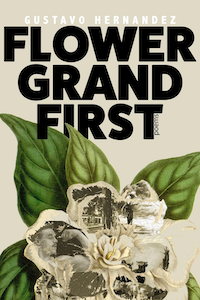
Moon Tide Press
Another debut collection is Flower Grand First by Gustavo Hernandez, a poet from Jalisco, Mexico who lives in Southern California. Hernandez has a keen sense for detail. In “Santa Ana: Downtown,” a systrophe about the city and its inhabitants in tight stanzas across fifty lines, parrots fill the winter sky after work. A “white woman” writes an article about “her surprise in finding them / in the city.” She “calls this place her hood, she takes / the hood’s good with the bad [ … ] / Wonders if she’d been better off / with a Spanish-style home.”
Hernandez’s observations of the mundane will remind readers of Gary Soto’s 1981 collection Where Sparrows Work Hard or of the attention to detail characteristic of the poems of Luis Omar Salinas, who was once extolled by Jose Montoya as “el mero Chingón de la poesía chicana.” Hernandez’s collection exposes a love of family, and lays bare the poet’s immigrant experience.
•
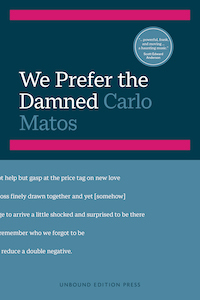
Unbound Edition Press
Carlo Matos’s latest collection We Prefer the Damned draws our attention to a poet’s struggle to explore identities of his past and present. A former MMA fighter, Matos reflects on his bisexuality and its erasure, leading readers to understand the poet’s awakening more fully. In a poem about his first male lover, “Threats and Imprecations,” the speaker shows the relationship as troubled from the start because it did not begin with “caresses,” but instead with threats. We see how his father taught him, by example, “to be wary of the gentle / for they are often rough with cruelty.”
Describing a desire steeped in cultural influences from childhood—George Michael, Madonna, Tony Danza, even Phil Collins appear in these poems—Matos reveals tensions between the past and present. The poems are flirtatious, with titles like “Cat and Mouth,” “Dar a Luz [giving the light],” and “Taking the Light,” and deftly turn from the external world to the speaker’s inner struggle, where there are no clear answers. He sees “the difference between childhood and adulthood” as a time of illusory expectations (“Cursing the Bisexual”)—a time when “we survive our foolishness” or “we survive without it” (“The Plateau”). These poems are sharp and tender.
•
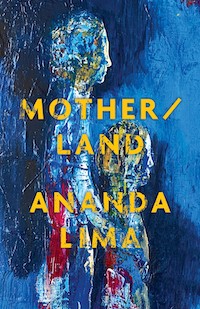
Black Lawrence Press
Ananda Lima’s ambitious debut Mother/land unites the languages and worlds of English and Portuguese. Examining the time before and the time after her assumption of motherhood, the poet wrestles with the fact that her child’s home is the U.S. and not Brazil like hers was. Her relationship to the past (family, language) becomes more obscured by her awareness of the particularities of U.S. culture.
The poem “Line” attempts to document a family tree, for which the speaker turns to her mother. While it is difficult now to imagine a time when documentation was rudimentary, in countries where technology and medicine are slow to arrive, generational recollections are crucial. The mother responds that “she had never thought of such things / and she wouldn’t know much past / her grandmother’s first name.” Sometimes only memories exist to keep us moving forward. Lima’s debut considers family lineage and the poet’s relationship to language and place as a new mother in America.
•
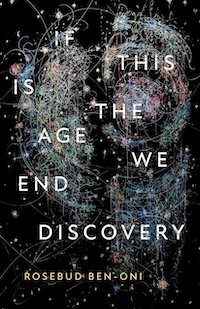
Alice James Books
In the Alice James Award-winning third collection by Rosebud Ben-Oni, If This Is the Age We End Discovery, the poet sings; these epics could be described as Latinx surrealism. The poems are electric and musical, with varying forms; some occupy an entire page in tight stanzaic forms, while others expand into loose wispy phrases that occupy only parts of the page. Ben-Oni takes readers through marvelous soundscapes derived from the algorithms of imagination, from the worlds of scientists and programmers alike. “Poet Wrestling With Reverse {Re-Verse} String Theory” asks: “What if we are the science / fiction. Or the humors // Of Dark Energy.”
In the digital age, access to reliable information can be life changing, yet the uncertainly of information mirrors life’s own ambiguity. Ben-Oni’s poems unravel to leave the reader with more questions than answers, eventually revealing more errors and less reasoning in the face of innovation and decay. As the title poem states, there’s nothing to do but “fear the end”—“If only drowning could bring to life / This flattening world / Of black & white.” Have we found a common understanding for the meaning of our own mortality? We hold each other to standards of right or wrong, and yet life is not any more peaceful. This collection reminds us that there is more to discover about each other, but challenges the banality of the language we use to make sense of life.
•
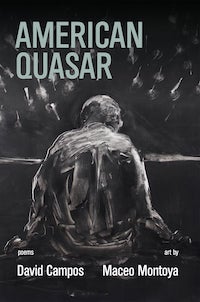
Red Hen Press
At first glance, American Quasar, the sophomore collection by David Campos, may seem to be solely about science, but the book is enhanced by a visual collaboration with renowned artist Maceo Montoya. The collection centers on a house fire that allegorizes trauma and loneliness, and Montoya’s monoprints, interspersed throughout the collection and resembling white and gray ultrasound images, intensify our sense of isolation. How does a home—and its destruction—shape who we are?
The framework for the entire collection, the poem “American House Fire” reflects upon an oppressive childhood, in which a speaker wishes “for the chill of starlight, / to believe in a just god who brings rain // to temper the blaze ravaging my house, / to feel, for once, what it’s like to win” and be released from generational expectations about home. The plain style of these poems creates vivid, descriptive narratives. In “Supernova,” the poet mines fire and fireworks, creating a wondrous image of a sky on fire and reinforcing the collection’s motif of transformative changes, all beyond the speaker’s control. “My father still believes I will become the star / to rest his last wishes on [ … ] / I’ve been preparing // for the departure [ … ] / to rise into the sky directly over my chest.” We’re reminded that the belief about wishing upon a star is as ancient as family itself.
With technology, today’s poets find themselves able to easily access information and global cultures. This accounts for an increasingly pluralistic representation in contemporary poetic collections, where the life of the individual constantly evolves into an uncertain and complex ethos. A poet’s ability to share these experiences fortifies the readers who tune in.
Ralph Waldo Emerson once declared that “the experience of each new age requires a new confession, and the world seems always waiting for its poet.” These six poets answer Emerson’s call and depict experiences informed by technology, language, classical myths, and artificial intelligence. Poets are always creating new worlds and these collections offer a small sample of the worlds of Latinx poets in 2021.
Published on December 29, 2021
